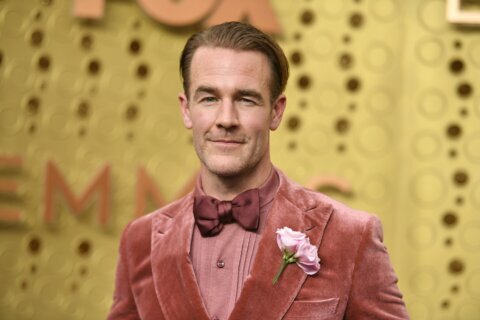In the D.C. area, “What do you do?” is a typical question that’s asked upon first meeting someone. But to those who believe in astrology, it’s often, “When, where and what time were you born?”
At least two times a year, Pauline Anson-Dross goes to astrologer Misty Kuceris. The Fairfax, Virginia, musician said it helps her gain perspective and get ready for what may be coming up. “I do at least one big (general reading), like an annual physical,” said Anson-Dross, who’s been meeting with Kuceris since the 1980s.
Anson-Dross said that getting an astrology reading “helps me to make clear decisions, as well as increasing my awareness of what’s going on, increasing my success in whatever I’m trying to endeavor.”
There are more than 80 kinds of astrology, according to Horoscope.com. One of the most familiar in Western culture is natal astrology — that’s using your birthday, and also what time you were born and where, according to Astrology.com.
Most people only know their sun sign; but if you’re curious, you can read more about the full natal chart here, or you can generate your natal chart at Co-Star, an astrological social networking service.
The emergence of astrology apps and accounts on social media platforms point to astrology’s popularity, especially among young people, according to a BBC report.
Apps such as Co-Star and Sanctuary World, as well as astrology enthusiasts on TikTok, have made astrology and its concepts accessible and entertaining. They also make it easy to break down the mysticism typically associated with astrology and other types of spirituality.
Amid the uncertainty of the coronavirus pandemic, Canadian astrologers said that they saw an increase in their business in 2020, Global News reported. While tarot is having a resurgence, with sales of tarot cards increasing, especially during the pandemic, The Washington Post reported.
A 2018 Pew Research Center study found that 62% of U.S. adults believe in at least one “New Age” belief, including astrology (29%). Of those surveyed, 32% who said they believe in astrology were between 18 to 29 years old, and 34% were between 30 to 49 years old.
Chris Carson, a therapist in Richmond, Virginia, thinks the growing trend in spirituality and astrology is universal.
“To me, it’s larger, it’s more accepting, and I think that is helping all of us. I think that’s helping us relate to people and it helps us understand people,” Carson said.
Some of her clients, including a lot of people in their 20s, know she uses astrology natal charts, and they come to her with interest in this kind of session. They already understand astrology and other practices “intuitively,” said Carson.
Christina Tseng, a therapist based in Maryland, works with a lot of young people and said astrology resonates with them because the world they grew up with “hasn’t made them feel particularly good.”
How astrology can help
Traditionally associated with divination and fortunetelling, astrologers said the readings are not about predicting the future, but helping people understand themselves better. “As above, so below,” is how Carson describes it. “What’s happening above us is also happening within us. And it starts with birth.”
Carson studies a “very Earth-based astrology” that looks at what was happening in the sky in the exact place, date and time of a client’s birth to “see what energetic imprints have impacted us.”
She said her clients seem settled and validated in knowing their charts, and it shows them where their gifts lie.
“I want them to feel competent in their strengths, and then, working on anything that’s not going well, we can ground it in their gifts and strengths,” Carson said.
Tseng incorporates philosophy from family therapy, including looking at family dynamics, when she reads a person’s astrological chart. She thinks about the individual and the relationship to parents and the wider culture, using an astrology chart to look at the interactions that are happening.
One of the misconceptions about astrology is that the sun sign — that corresponds to the month and date you were born — is everything. But an astrology birth chart aims to map the placement of all the planets at the exact moment you were born, which “holds the key to your unique life path and personality,” according to Astrology.com.
Using an astrology chart, Tseng looks at how the planets, the houses and other facets of the chart are interacting with each other.
“There’s going to be no birth chart, no blueprint, that is inherently flawed. But there could be a lot of challenges,” and Tseng said it’s the astrologer’s job to “try their best to interpret what they see.”
Author Michael M. Hughes uses and teaches tarot outside of his job as a copywriter at the Baltimore Banner. For him, tarot is a way of having a conversation.
“I don’t pretend to tell people’s futures. I don’t believe that anyone can tell you what’s going to happen or what’s not going to happen. But this is a process where two people can sit and look at these really resonant images and find some clarity in their lives, or find some good advice or a new way of thinking about a situation,” which can be a very therapeutic process, Hughes said.
For Anson-Dross, astrology’s goal is to raise consciousness and help people elevate their awareness.
“Most everyone else that I know that deals with astrology or these kinds of tools, the intent is to have a better quality of life, to make better choices, to do things better in general and … try to bring more positive energy or love into the surrounding circumstances and people around you,” Anson-Dross said.
‘They want to believe in it’
Benjamin Radford is an editor for Skeptical Inquirer magazine. He does research for the Committee for Skeptical Inquiry, a nonprofit organization based in Buffalo, New York, that looks into “unusual claims.”
“Our premise and our mission is to try to understand these phenomena from a science-based, critical thinking perspective,” Radford said.
He compares people’s belief in astrology to the placebo effect — if people believe that they are a particular sign, then the characteristics of the sign apply to them — and he said he believes astrology is a pseudoscience.
“The problem here is that you’re telling people what to look for. This goes back to psychology. And it’s what we call the Barnum Effect,” Radford said.
That’s when people believe that a personality description applies specifically to them, even though the description is actually filled with information that applies to everyone, according to Encyclopaedia Britannica.
Even when different systems of reading the stars often say different things, Radford said the reason people believe astrology works is psychological, “not because there’s some correlation between our actual characteristics and personalities and futures.”
For Hughes, however, it’s about, “Is it useful? Is this process that I engage in when I read cards for somebody, is it helpful to them? Do they walk away feeling better?”
Recently, experts concluded that reacting to a placebo is not proof that a certain treatment does not work; and that under the right circumstances, a placebo can be just as effective as traditional treatments, a Harvard Medical School publication reported.
Kuceris, based in Springfield, Virginia, said astrology is neither a science nor a pseudoscience. She said that a component of astrology involves businesses and trend analysis, which involves looking at the cycles that occur in history and the cycles that occur in society.
“And then based on those cycles, which you see in astrology, you can come up with some forecasting — not predictions. There’s a difference,” Kuceris said.
Kuceris drew parallels to economics or psychology. “They’re based on cycles; they’re based on behavioral factors; they’re based on understanding humanity,” she said.
While acknowledging that many astrologers are sincere and are trying to do good, Radford said the nature of the dynamic between the astrologer and the client is one where “they want to believe in it.”
“They’re not trying to fool anybody. They have just bought into and spent, in some cases, lots of money and lots of time, learning the system without validating it scientifically,” Radford said.
What’s the harm in it?
Radford, with Skeptical Inquirer, advised not putting too much stock in astrology. “Take it for what it is. … Take it as entertainment.”
He cautions on the danger of making a life decision based on astrology charts or what one has been told during a reading.
“It’s kind of offensive because it violates their autonomy, right? If you sincerely want to date this person, if you really want to do something, you really want to take a job wherever else, don’t hand that decision to some stranger who you paid $70 or $200 to read your chart,” Radford said.
Kuceris said that as an astrologer, she’s more like a “life facilitator.”
“I don’t give advice. I share the information that I see and the trends that they’re going through,” and they make their own decisions, Kuceris said.
Carson said she believes people have a right to believe whatever they want and what works for them.
“I think we have a lot more in common than they probably even understand. If they understand that praying or thinking positively or believing in something helps their lives in any capacity, well, then we believe in the same thing. It just might sound a little different or look a little different,” Carson said.
“They’re just tools,” Anson-Dross said. “It doesn’t have to run or rule your life. It’s just a way to help get a little more perspective, and how to bring light into a situation and more awareness, more consciousness.”








